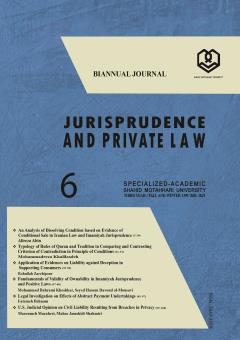-
-
-
Open Access Article
1 - Investigating Validity of Probative Evidences and Its Application in Jurisprudence and Islamic Law
Seyed Abolqasem Naqibi Elham Maghzi NajafabadiAbstract: The validity of probative evidences is one of the fundamental discussions in methodology of religion. Probative evidences (religious circumstantial evidences) are among the evidences needed for interpretation and inference of the Sharia rules, the signifiers o MoreAbstract: The validity of probative evidences is one of the fundamental discussions in methodology of religion. Probative evidences (religious circumstantial evidences) are among the evidences needed for interpretation and inference of the Sharia rules, the signifiers of which–in addition to comparative signified–have sometimes evidentiary effects. Evidentiary effect in methodology means the religious effects attributable to the rational instruments, necessities and requirements, either ordinary or accidental, which can be taken as evidence or codes of action. In case of the validity of probative evidence and its reasons, three theories may be put forth: Some jurists attribute the nature of evidence, in terms of proof, depending upon its validity thus rule on absolute validity of probative evidence. Some others, however believing in absolute validity of the probative evidence, have attributed the reason to the quality of proof and attribution of the reasons for validity of the evidence. The third group of jurists believe in a detailed manner which draws a line of separation between various types of evidence and probative evidences. Apparently, to study the validity of probative evidences, the reasons for validity of the evidence must be taken into consideration. Therefore, if the reason behind validity of the evidence is an instance of compulsory obedience, its probative reasoning shall not be valid but if it is based on logical and consistent usages (which is true in the case of the majority of cases) the criterion will be constraints in logical usages and related terms. This is because men of reason at times take something as evidence while at the same time reject its probative values, such as evidence on probation, possession, presumption of marriage bed, and confession. Manuscript profile -
Open Access Article
2 - An Analysis of Dissolving Condition based on Evidence of Conditional Sale in Iranian Law and Imamiyah Jurisprudence
Alireza AbinA broad interpretation of the dissolving condition indicates that it is a condition realization of which revokes undertaking(s) between the obligor and the obligee and cancels the contract or other similar legal instruments from the beginning (with a retroactive effect) MoreA broad interpretation of the dissolving condition indicates that it is a condition realization of which revokes undertaking(s) between the obligor and the obligee and cancels the contract or other similar legal instruments from the beginning (with a retroactive effect). There is no express legal text on the rule of dissolving condition in domestic standing laws. This has given birth to diversified reasoning by the legal experts. Moreover, in legal terms, the approach followed by Imamiyah jurists vis-à-vis this legal institution is not identical so that some consider it problematic based on such evidences as principle of definitiveness of conditions, inconsistency of dissolving condition with requirement of nature of condition and lack of legality of evidences on conditions. On the contrary, some believe in the soundness of the institution of dissolving condition based on the legality of the evidences on conditions. This paper is devoted to analysis of consequent opinions and approaches of experts to finally put forth its selected viewpoint on feasibility of soundness and use of such institution in Iranian law and Imamiyah jurisprudence and prove legal soundness of its application on attachment of Articles 232 and 233 of Civil Law to Articles 10 and 975 of the same law. However, it seems that the generality of evidences on conditions prove legality of conditions in creating or destroying the legal effects. Manuscript profile
List of Articles evidences
-
The rights to this website are owned by the Raimag Press Management System.
Copyright © 2017-2024


